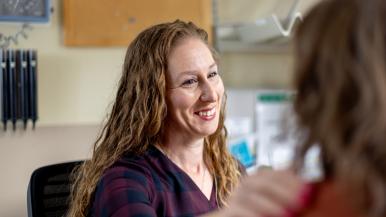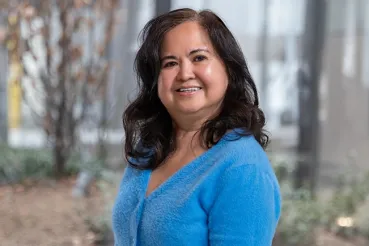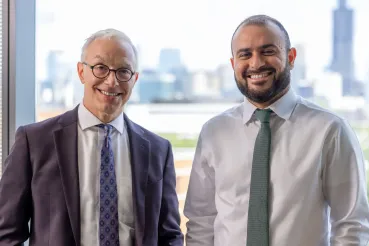Through successes and struggles, everyone needs a strong support system to rely on.
For people diagnosed with Parkinson’s disease and those who serve as their care partners, support is essential but often hard to find. The experiences of the disease — particularly nonmotor symptoms such as cognitive changes, difficulty sleeping, depression, anxiety, apathy, hallucinations, pain and weight loss — can surface feelings of isolation and overwhelm.
In the words of Jori Fleisher, MD, MSCE, FAAN, associate professor in the Department of Neurological Sciences and one of the field’s most passionate advocates for people with Parkinson’s disease and their caregivers: The cavalry isn’t coming.
But this is exactly the challenge Dr. Fleisher has devoted her career to solving. Driven by personal experiences with family members affected by neurologic diseases and the individual experiences of the patients she treats, Dr. Fleisher seeks to implement, improve and widely distribute programs that improve the lives of people with Parkinson’s disease, other movement disorders and their care partners. She strives to equitably expand access to quality care for those who are homebound or in later stages of the disease and ensure patients’ individual goals and wishes are achieved.
Integral to Dr. Fleisher’s approach is the idea that when caregivers are cared for, people with Parkinson’s disease also experience a better quality of life. For years, Dr. Fleisher and her team have piloted a novel model of care involving interdisciplinary home visits for people with advanced Parkinson’s disease and peer mentoring for caregivers.
In August 2023, Dr. Fleisher’s efforts were rewarded with a prestigious Research Project Grant, or R01, from the National Institutes of Health for her project “PERSEVERE in Lewy Body Dementia: A Randomized, Controlled Trial of Peer Mentor Support and Education” to study the impact of caregiver peer mentorship on a larger scale over the next five years.
“It’s beyond humbling and still a little hard to believe,” Dr. Fleisher said. “Going into medicine, I always thought that I would be a clinician or maybe a clinician educator. I never thought that I was a researcher. To be able to do projects that, to me, feel directly related to giving back and having a tangible benefit to patients and families — and to have that funded by the NIH at a level that’s comparable with basic science research — is such a validation of this work. It centers caring for people and putting their needs front and center.”
Advancing the caregiver peer mentoring model
The PERSEVERE study builds on Dr. Fleisher’s previous donor-funded work to help people living with advanced Parkinson’s disease, people with Lewy body dementia, or LBD, and their caregivers manage the significant burdens they face. The national study will evaluate the efficacy of an educational intervention delivered to current caregivers by trained and experienced caregiver peer mentors. Researchers will examine if and how the program improves the well-being of caregivers and their loved ones.
The study also places a much-needed focus on LBD — a form of dementia caused by abnormal deposits of the protein alpha-synuclein in the brain that disrupt the production of dopamine, which can cause parkinsonism. LBD affects at least 1.4 million people in the U.S., and Parkinson’s disease dementia is a form of LBD. Most people with LBD are cared for by loved ones experiencing strain and lacking the knowledge, resources and support to identify and manage the disease’s challenges.
In the study’s first year, Dr. Fleisher will partner with the Lewy Body Dementia Association, the Parkinson’s Foundation and the Davis Phinney Foundation to recruit and train 120 experienced family caregivers who will serve as mentors in the study.
“You could know everything you need to know about the symptoms your loved one might have, but it may do little good if you are neglecting your own self-care, if you’re not acknowledging the guilt, anger or changes in roles and relationships that come with those symptoms,” Dr. Fleisher said. “The better the caregiver does, the better the person with the disease does. We’re doing a disservice to our caregivers that ultimately harms them and their loved ones if we don’t acknowledge that.”
Following mentors’ recruitment and training, Dr. Fleisher and her team will recruit more than 500 current caregivers of people with LBD. These caregivers will be randomly split between a control group and an active group. The control group will receive a light educational intervention consisting of weekly emails on topics related to disease progression and caregiving. The active group will receive this information in addition to a trained peer mentor who will coach them through a curriculum covering LBD knowledge and social support topics.
Outcome data from the study will inform further adaptation and distribution of this model.
“With the way our health care system is set up, family caregivers don’t have a safety net,” Dr. Fleisher said. “It often takes so much effort for someone to finally say, ‘I need help. I am trying to do all of this care 24/7, and I can’t do it myself,’ but our health care system doesn’t pay for that.
“We’re hoping to come up with a low-cost safety net for our family caregivers and for them to know that all of that lived experience and wisdom is valuable to others. It’s not just that it was valuable when they were going through it. It has value for everyone coming after them until we have better treatments and a cure.”
Making a tangible difference
Dr. Fleisher’s work benefits from the philanthropic support of patients and their care partners. Inspired by the attentiveness and thoroughness of the care she received, Elena Urschel has supported Dr. Fleisher’s work since 2020.
“She’s such an advocate, and her passion for helping people and living better align so beautifully,” Dr. Fleisher said.
The model Dr. Fleisher is developing will lessen stress for everyone and benefit other fields, Urschel said.
“Many donations are given for cures of diseases, and that is very noble and good,” Urschel said. “However, I believe it is just as important for the quality of life to improve while we are finding a cure.”
Urschel added that she knows her disease will progress, and she wants her daughter, who serves as her care partner, to have resources and support. “I don’t want her to be so stressed that she gets sick, too,” Urschel said.
“I don’t want to be a burden to her. It helps patients, too, knowing their caretaker has someone to go to. I have some answers but not all. For my daughter to talk to someone who is going through the same thing could be so reassuring.”
Experienced care partners Claire Pensyl and Tom Manak praise Dr. Fleisher as one of the only researchers focused on both people with Parkinson’s disease and their care partners.
“The Parkinson’s world is frustrating because there’s little focus on patients, much less caregivers,” Pensyl said.
Pensyl cared for her late husband, Ira Bell, and Manak for his late wife, Ro. Both Pensyl and Manak got involved with Dr. Fleisher’s work because of her inclusivity of people with advanced Parkinson’s disease and her willingness to provide palliative care — both somewhat rare to find in the field.
Both Pensyl and Manak participated in Dr. Fleisher’s previous caregiver peer mentorship pilots and continue to serve as mentors and advocates today.
“They are so committed to making life better for people with Parkinson’s disease and Lewy body dementia and the care partners who come after them,” Dr. Fleisher said.
Pensyl and Manak are dedicated not only in their actions but also through their charitable support. They suggested establishing the “Fund to Improve the Well-Being of People With Parkinson's and Their Caregivers” this year so that their contributions and gifts from others will safeguard Dr. Fleisher’s research time, help her hire the right people to advance her work and inspire like-minded people to contribute.
Dr. Fleisher explained advocacy and support for the type of research she does is critical, as it is often not as tangible to potential funders as the discovery of a protein or gene.
Pensyl recalls her mentor from Dr. Fleisher’s first research project at Rush inspired her own continuing advocacy for Parkinson’s patients and their care partners.
“Although his first wife died many years ago, my mentor is still involved in advocacy and moderates a support group for atypical Parkinson’s patients and their care partners,” she said. “He continues to mentor me.”
Manak added that the more he learned about the disease, the better he was able to process some of the things his wife said or did.
“Claire and I have talked extensively about how physicians are called movement disorders specialists, but movement is such a small piece of what Ira and Ro had to deal with,” Manak said.
“We want to support what Dr. Fleisher is doing because it’s a different perspective on care for people with Parkinson’s and their care partners.”




